I want Jesus to let me off the hook. Me and the rich young man. But he won’t. “Go, sell what you own, and give the money to the poor, and you will have treasure in heaven; then come, follow me.” (Mark 10:21).
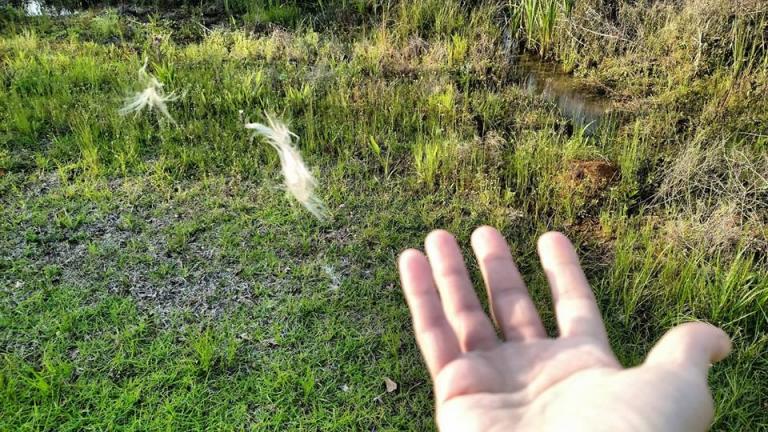
Texts: Mark 10:17-31; Amos 5:6-7, 10-15
I’ve tried to reason away what this really means.
Maybe Jesus’ command is just for that rich young man long, long ago in a land far, far away. Maybe it was an instruction tailored to his particular situation. Jesus isn’t really talking to me, is he? I’m not rich, or powerful, or a man for that matter. So Jesus’ words don’t apply to me. Right?
Maybe this is just another one of Jesus’ hyperboles, a rhetorical device meant to shock us just enough to rethink our next big-ticket purchase. I mean, I’m big on fighting against “affluenza.” But give up everything? Jesus doesn’t expect me to actually give up all my possessions, does he? I remember listening to a Buddhist monk talking to our social studies class in middle school explaining how he had given up everything – all possessions – to pursue enlightenment. I was aghast! Give up my harp that brings me and others so much joy? Give up my clothes for those weird robes you’re wearing? Give up my hair, shave my head bald? No way. Maybe for some kooks, but not for me, my 12-year-old mind thought.
Hey, how about this? I can follow Jesus’ prescribed sequence in reverse! 1) Follow him. 2) Get my heaven-treasure. 3) Give some money to “the poor.” 4) Sell off a couple of things I don’t want at a yard sale. 5). Go happily on my way. Dusting off my hands of any guilt – I’m off scott free.
But it doesn’t work that way, does it?
Jesus was specific about the order of those verbs: go, sell, give, receive, follow.
In that order. Going and selling our possessions in order to give to the poor precedes being able to receive that heaven-treasure. And all of that precedes following Jesus.
The rich young man only got as far as the first verb, “go.” He left. And I walk away with him every time.
What does it cost me to walk away? What would it cost me to follow?
All the excuses I come up with are examples of what Sarah Hinlicky Wilson calls “time-honored strategies of management.” Yes – that’s what I want! I want a way to manage Jesus’ claim upon me in this text. I want a way to manage every biblical text that challenges my comfortable, middle-class lifestyle.
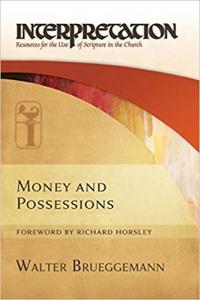
But Jesus is not letting me or the rich young man off the hook. And Old Testament scholar Walter Brueggemann is no help. He says that we want to “tone down the radical material specificity of Jesus.” No kidding.
In his book Money and Possessions, he writes: “It is clear that Jesus was preoccupied with this-worldly material reality” and the ways in which money and possessions “define and skew social relationships” (185). Okay, I’m with you so far.
He continues:
Jesus’ ministry, conducted in subversive act and in disruptive word, concerned the performance of an alternative economy willed by God in defiance of the dominant economy that was legitimated by Rome and practiced by those who accepted imperial hegemony with its exploitative protocols. . . . Jesus’ term for the alternative economy was ‘kingdom of God,’ that is, a social practice and set of social relationships that are congruent with the God of the covenantal Torah of ancient Israel. (186-7)
My God (and I mean that for real), he’s talking about a redistribution of wealth!
My wealth! You’ve got to be kidding me!
Nope, says Brueggemann: “Life with Jesus is about abandoning wealth” (190).
What?! I can hear the capitalist howls of rage!
But Brueggemann has a point. And the Acts community tried to live that out. In the very first church, the wealthy did sell their possessions and distribute the money to the poor in their community. They formed an intentional community of sharing in common with each other.
So maybe the abandonment of wealth wouldn’t be such a bad thing?
Especially since wealth is so illusory. I read one commenter’s observation that most of us are just “desperately faking middle class.” Many of us are just one disaster, one health crisis, one pink slip, one corporate financial crisis away from losing everything and becoming yet another poverty statistic.
Some of us are so deep in debt that if the creditors came knocking tomorrow, demanding more than the minimum payments that barely even cover the interest, we would go bankrupt, lose our houses, and find ourselves in the homeless shelter across town.
Honestly – that could be me.
My life is precariously balanced on a house of cards – credit cards. Even the slightest bump, and I know the whole thing will collapse.
But that gets me off the hook with Jesus, then, right? Since I only have a veneer of middle-class respectability, and Jesus knows that it’s all just an act, maybe he’ll let me play my charade just a little longer. And then take pity on me when it all comes crashing down, right?

You can tell by now that I need a way to not see myself as the target of Amos’ critique:
6 Seek the Lord and live, or he will break out against the house of Joseph like fire, and it will devour Bethel, with no one to quench it. 7 Ah, you that turn justice to wormwood, and bring righteousness to the ground!
10 They hate the one who reproves in the gate, and they abhor the one who speaks the truth. 11 Therefore because you trample on the poor and take from them levies of grain, you have built houses of hewn stone, but you shall not live in them; you have planted pleasant vineyards, but you shall not drink their wine. 12 For I know how many are your transgressions, and how great are your sins— you who afflict the righteous, who take a bribe, and push aside the needy in the gate. 13 Therefore the prudent will keep silent in such a time; for it is an evil time. 14 Seek good and not evil, that you may live; and so the Lord, the God of hosts, will be with you, just as you have said. 15 Hate evil and love good, and establish justice in the gate; it may be that the Lord, the God of hosts, will be gracious to the remnant of Joseph. (Amos 5:6-7, 10-15)
I know you’re not talking about me, Amos, are you?
What have I done to trample the poor and take their grain? Surely, I can keep living in my house. Surely, I can still drink my wine. Here – I can give you a nice long annotated list of those God needs to punish for their predatory wealth. The ones who have many transgressions and great sins. The one who afflict the righteous and take bribes and push aside the needy at the gate.
(By the way, you won’t see my name on that list. I took the liberty of crossing it out for you. You’re welcome.)
Personally, I’m with you, Amos – I do think this is an evil time. I really do want to seek good and not evil, hate evil and love good. I really do want justice established at the gate. As Old Testament Professor Bo Lim reminds us: “When society makes a turn for the worst and the privileged can manipulate the systems of the public and private sector for their own selfish gain at the expense of the poor and marginalized, ‘seeking God’ involves publicly rejecting these forms of evil and working towards the establishment of justice.”
I’m all for that! Just spare me, God, when the reckoning comes due, okay? If you can just do me that favor, then I’m ready!
Or am I?
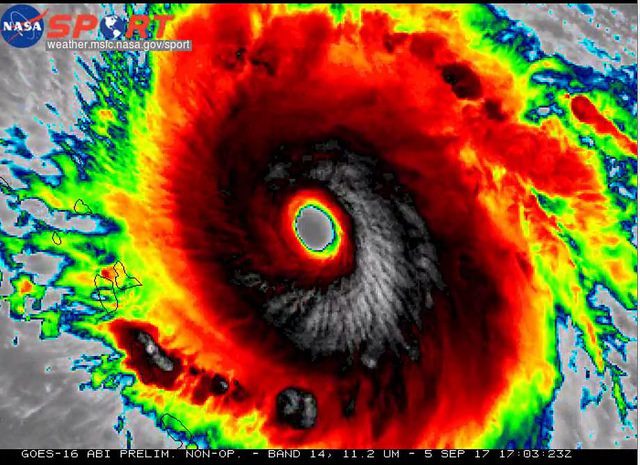
GOES-16 captured this infrared imagery of category 5 hurricane Irma bearing down on the Leeward Islands on September 5, 2017. Public domain. flickr.com
I read that the UN says we have 10 years to get climate change under control. We have to completely retool our energy consumption or face catastrophic global consequences due to global warming and climate disruption. This will require a complete rethinking of our economy, giving up a worldview and a way of thinking about ourselves that we hold onto for dear life.
But it is a life that is leading to death.
Death for thousands of people who perished just in the last year from hurricanes and typhoons supercharged by the warming waters of climate change. Death for thousands of species whose names I can’t even pronounce and who I’ve never ever seen. Deaths of people in hot zones where the temperatures are rising to unprecedented levels; where sea levels are swallowing up homes and villages; where droughts are squeezing the life out of land, animals, and people – people whose names I can’t even pronounce and who I’ve never met.
Most of them are “the poor.” To them, I am the rich maybe-not-so-young (wo)man. I’m part of the problem because I benefit from a system that enables me to live the way I do while they bear the burden of economic and ecological costs. While they live in poverty and die of diseases and watch their homes destroyed, I live in my house and drink wine and eat tasty food and drive cars and fly to conferences and upgrade my cellphone and and and . . .
“You lack one thing; go, sell what you own, and give the money to the poor, and you will have treasure in heaven; then come, follow me.”
There he goes again. Jesus keeps coming at me, a rich not-so-young woman. He keeps looking at me. And he keeps loving me.
I’m not sure I want that kind of love – a love that sees right through my pretenses and my “virtue signaling.” A love that makes me turn away grieved because I would rather cling to my possessions than to have my hands open to receive this elusive “treasure in heaven.”
But here’s the thing. I’ve known for a long time that by not letting go now, by not practicing the discipline of letting go – it will make it that much harder when there is no longer the option to do so. When the piper comes to be paid. When the bill comes due.
We may think we have gained the whole world. But it is costing us everything.
So what am I going to do?
I already practice a little letting go every Lent. I’ve practiced giving up television for 40 days. I gave up plastic water bottles long ago. I gave up eating meat three years ago. And next week, my colleague Emily Askew and I will try the 7-day vegan challenge. She suggested to our seminary’s Green Task Force that we each take a step toward more ethical eating over the next month. So for seven days I’ll let go of all animal products in my diet. We’ll reduce our carbon footprint and eat foods free of animal cruelty.
See, Jesus? Can’t you see I’m trying!
But who am I kidding? All this is just baby steps at best, more virtue-signaling at worst.
Jesus, looking at her, loved her and said, “You lack one thing; go, sell what you own, and give the money to the poor, and you will have treasure in heaven; then come, follow me.”
Will you stop looking at me like that?
I’m not ready for the Jesus-gaze. I’m not ready for that look of love.
Or maybe I am?
There are groups of people who have realized the kind of letting-go that is going to be required of us in the next decade to come.
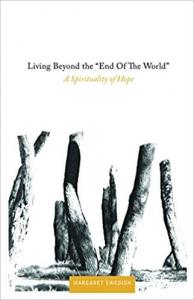
- Margaret Swedish wrote a book ten years ago called Living Beyond the “End of the World”: A Spirituality of Hope. She saw it coming, what we’re going through now. She started the Center for New Creation to help people prepare and live into this age of letting go.
- Another Margaret – Margaret Wheatley – has training to become Warriors of the Human Spirit as we go through the collapse of this civilization. Her book Who Do We Choose to Be: Facing Reality, Claiming Leadership, Restoring Sanity opened my eyes to the kind of letting go that will be required of us. She is training these Warriors of the Spirit in the areas of identity formation, stable mind, direct perception, mind-body integration, and community.
- Yet a third Margaret, a friend of mine – Margaret Bullitt-Jonas – is working with me in co-editing a book called Rooted and Rising: Voices of Courage in a Time of Climate Crisis. It’s a collection of essays from religious environmental activists in commemoration of the 50th anniversary of Earth Day. As I read the work of each of these authors, they are teaching me more and more about letting go.
This holy trinity of Margarets is showing me what is going to be required as I seek to follow Jesus. The steps I’m going to have to take, and how the sequence of Jesus’ verbs are going to take shape in my life.
I realize that it’s going to require something very different of me. Something I’m not ready for.
I keep coming up with all kinds of good excuses and valid reasons. I have a husband and two children to raise and support. I have a fantastic job teaching at a seminary and writing books. I’m living my dream life.
I’m sorry Jesus, I’m just not ready to let that go. This camel isn’t going to change into a gnat in order to fit through that needle. It would take a miracle for that to happen.
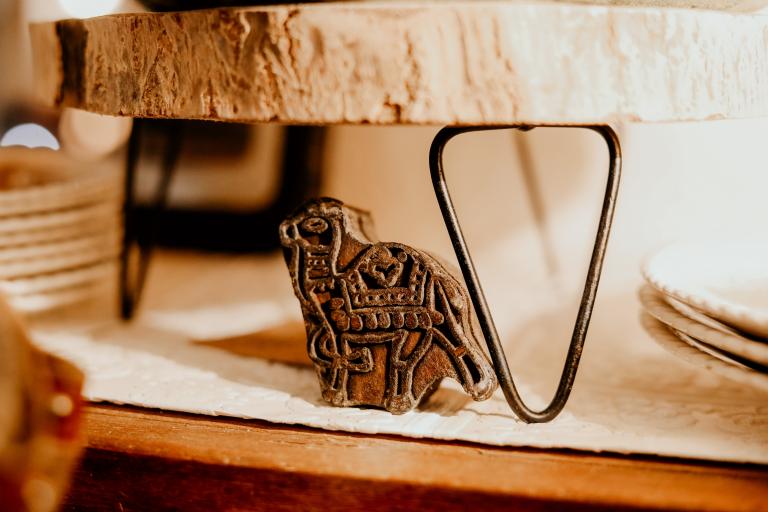
“Then who can be saved?”
Jesus looked at them and said, “For mortals it is impossible, but not for God; for God all things are possible.”
There’s that look again. The look of love. A fierce, not-letting-go-of-me-until-I-let-go kind of love.
I know that Amos’ fire is coming. Dare I pray that God will be merciful to the remnant of me that is left? To the remnant of this planet that is left? To the remnant of humanity that is left?
Jesus, looking at us, loves us and says, “You lack but one thing.” One thing, five verbs: Go. Sell. Give. Receive. Follow.
I think we need to be prepared for the awful, world-changing, life-changing, heart-changing miracle that is coming.
 Leah D. Schade is the Assistant Professor of Preaching and Worship at Lexington Theological Seminary (Kentucky) and author of the book Creation-Crisis Preaching: Ecology, Theology, and the Pulpit (Chalice Press, 2015). She is an ordained minister in the Lutheran Church (ELCA).
Leah D. Schade is the Assistant Professor of Preaching and Worship at Lexington Theological Seminary (Kentucky) and author of the book Creation-Crisis Preaching: Ecology, Theology, and the Pulpit (Chalice Press, 2015). She is an ordained minister in the Lutheran Church (ELCA).
Twitter: @LeahSchade
Facebook: https://www.facebook.com/LeahDSchade/.
Read also:
We’ve Lost the Climate War. It’s Time to Surrender.
Preaching as Resistance: Encountering Pharaoh—and Climate Change













